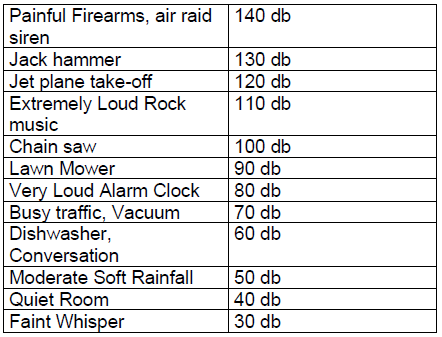PROTECT YOUR HEARING
According to a 1990 survey by the National Center for Health Statistics, over 23 mil ion Americans have some hearing loss. One third of all hearing loss cases are from the loud noises of modern life. Loud noises destroy the tiny hair cells in the inner ear that signal the auditory nerve to send sound messages to the brain. Once these cells die they never grow back.
The result is a kind of deafness called "sensorineural hearing loss"; this affects both volume and clarity, first at high pitches, then later at lower pitches where speech is heard. Loud noise may also cause "tinnitus" or ringing in the ears. Tinnitus often signals impending hearing loss.
"Young people are aging their ears before their chronological time", says audiologist David Lipscomb, who has researched hearing loss in students at the University of Tennessee. In the fall of 1969, he tested the hearing of entering freshmen and found about 60 % of them had hearing loss. 14% of the young men tested had hearing similar to the average 65 - year old. By comparison, something - probably noise - had damaged hearing during the teen years.
In the absence of loud noises, hearing doesn't appear to deteriorate much with age. Deep in the Sudan bush, a primitive tribe lives in a quiet environment, surrounded by swamps and the White Nile River. A study done in the sixties found that people of any age in the tribe had hearing superior to that of a comparison group of American farmers. Furthermore, the old people heard as well as the young.
Noise is measured in decibels. Anything 80 decibels or louder, such as a loud buzzer alarm clock, can harm your hearing. The higher the decibel the louder the noise. (See accompanying chart). The louder the noise, the shorter the time it takes to hurt your hearing. Your ears can endure 90 decibels of noise, such as a lawn mower, for about eight hours before damage occurs. For every 5 decibels above that, it takes only half as much time for damage to begin. The average rock concert or stereo headset at full blast (about 110 decibels) could damage your ears in two hours.
Loud noise produces a number of involuntary reactions in the human body and THE REACTIONS MAY PERSIST AS LONG AS FIVE TIMES THE DURATION OF THE NOISE ITSELF. The pupils dilate and blood vessels constrict, the skin pales, the muscles tense; the hearer may wince, and hold his breath. (American Family Physician, October, 1970, pages 151-152). Other reports show that people living in a noisy atmosphere die earlier than people living in quiet areas.
When loud noise can't be avoided — guard your ears with hearing protection devices. Stuffing cotton in your ears will not help much. Earplugs are the best choice. Earplugs come with a noise reduction rating on the label established by the Environmental Protection Agency. The strongest rating available in local stores is a 30 decibel reduction. For anything stronger you would have to get them from an audiologist.
For a free pair of 30 decibel earplugs, write to the "Hearing is Priceless" Program of the House Ear Institute, 2100 West 3rd St., Fifth Floor, Los Angeles, CA 90057.
DECIBEL CHART





